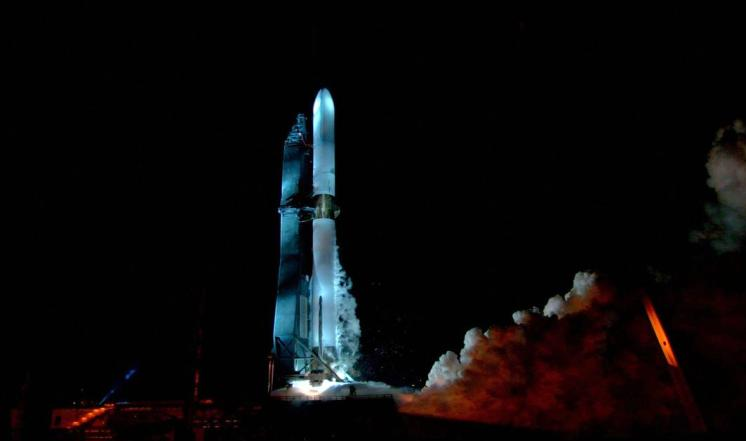
Blue Origin, the space exploration company owned by Amazon founder Jeff Bezos, is preparing for the first flight of its unmanned rocket. This will be Blue Origin's first attempt to put a rocket into orbit, marking a key step in the company's bid to challenge the aerospace market dominated by SpaceX.
The rocket, named New Glenn, is being readied for launch from a Florida launch pad unused for nearly two decades and is scheduled to lift off from Cape Canaveral Air Force Station as soon as next week, CNN reported.
The New Glenn rocket is made up of several parts: First is the rocket booster of the first stage, which provides the initial thrust at launch. Above the booster is the rocket's upper stage, which includes a cargo bay, protected by a protective nose cone, that will house the mission's experimental technology, the Blue Ring Demonstrator, to test technologies needed for the Blue Ring spacecraft; The Blue Ring spacecraft will serve as a space sharing vehicle, sending satellites farther into space on demand.
Blue Origin said the Blue Ring demonstrator will test "orbit-to-ground communication capabilities" during the six hours of the flight, as well as validate its telemetry, tracking and command hardware, as well as ground-based radiation tracking capabilities. The demonstrator is part of an agreement between Blue Origin and the Department of Defense's Innovation Division.
Drawing on SpaceX's success in recovering rocket boosters, Blue Origin also plans to guide New Glenn's first-stage rocket booster back to a safe offshore platform within minutes of launch. In the future, New Glenn rockets could power national security launches, transport Amazon Internet satellites, and even participate in the construction of a space station that Blue Origin is developing with commercial partners.
In 2016, Blue Origin announced the development of a New Glenn rocket designed to surpass SpaceX's Falcon 9 rocket in order to put up to 45 tons of spacecraft into orbit. However, the first launch, originally scheduled for 2020, was eventually delayed.
Delays to first flights are not unusual in the space industry, however, and rocket companies typically take a conservative approach, opting to launch less important virtual payloads rather than actual satellites or equipment. Blue Origin stated that the company has chosen to move forward with rocket development in a slow and pragmatic manner, stressing that it will not "cut corners" to ensure that every link is safe and reliable.
Although Blue Origin is trying to catch up, SpaceX's current momentum is clearly leading the space industry. SpaceX's first orbital rocket, Falcon 1, launched successfully in 2008, and has made hundreds of orbital launches since, and its Falcon 9 rocket has suffered two flight failures and a launchpad explosion, but no fatal accidents so far.
Although Bezos and Musk often fight publicly, Musk has always maintained a positive attitude toward the first flight of New Glenn. In December, he posted on the X platform: "Have a good flight!"

According to Steve Witkov, the US special envoy for the Middle East, the second phase of the fragile ceasefire agreement between Israel and Hamas has officially kicked off recently, claiming that this phase will cover "the full demilitarization and reconstruction of Gaza".
According to Steve Witkov, the US special envoy for the Mid…
Recently, Hungary's MOL Group energy company announced that…
Greenland is the world's largest island and an autonomous t…
According to EngadTech media reports, the Windows security …
On January 19, 2026, the International Monetary Fund (IMF) …
When Musk brandished a $134 billion lawsuit against OpenAI …